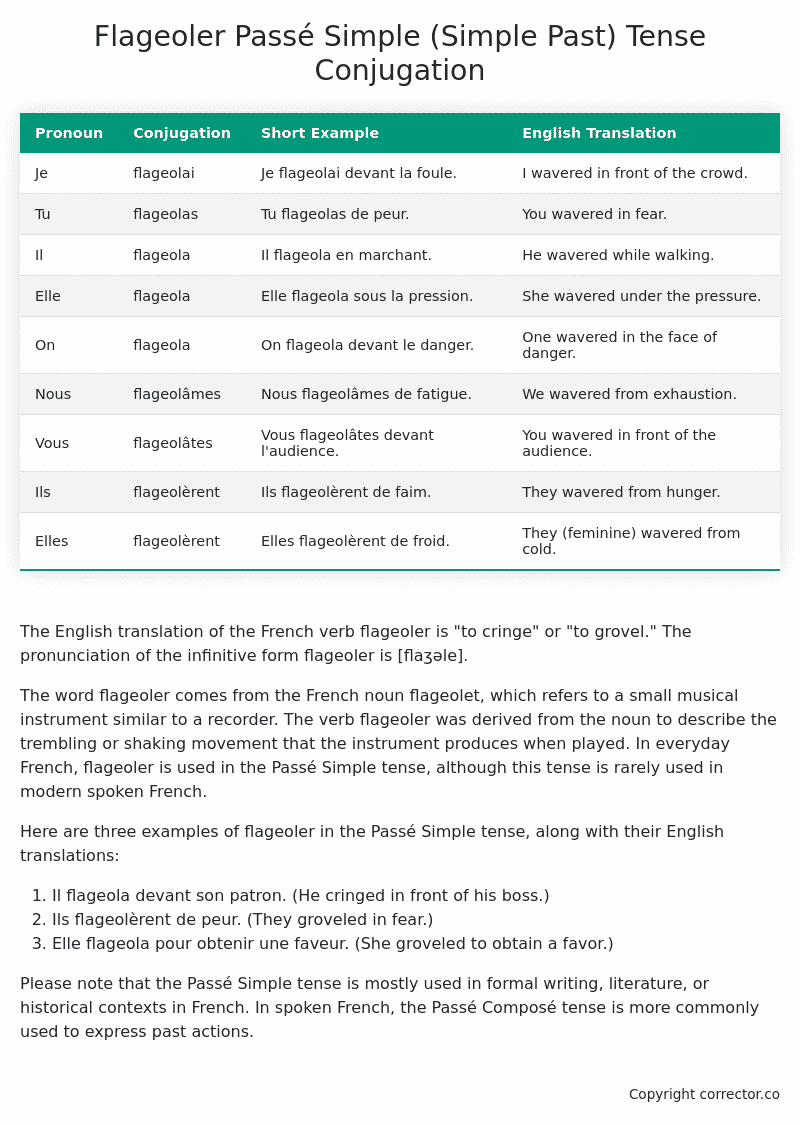Passé Simple (Simple Past) Tense Conjugation of the French Verb flageoler
Introduction to the verb flageoler
The English translation of the French verb flageoler is “to cringe” or “to grovel.” The pronunciation of the infinitive form flageoler is [flaʒǝle].
The word flageoler comes from the French noun flageolet, which refers to a small musical instrument similar to a recorder. The verb flageoler was derived from the noun to describe the trembling or shaking movement that the instrument produces when played. In everyday French, flageoler is used in the Passé Simple tense, although this tense is rarely used in modern spoken French.
Here are three examples of flageoler in the Passé Simple tense, along with their English translations:
- Il flageola devant son patron. (He cringed in front of his boss.)
- Ils flageolèrent de peur. (They groveled in fear.)
- Elle flageola pour obtenir une faveur. (She groveled to obtain a favor.)
Please note that the Passé Simple tense is mostly used in formal writing, literature, or historical contexts in French. In spoken French, the Passé Composé tense is more commonly used to express past actions.
Table of the Passé Simple (Simple Past) Tense Conjugation of flageoler
| Pronoun | Conjugation | Short Example | English Translation |
|---|---|---|---|
| Je | flageolai | Je flageolai devant la foule. | I wavered in front of the crowd. |
| Tu | flageolas | Tu flageolas de peur. | You wavered in fear. |
| Il | flageola | Il flageola en marchant. | He wavered while walking. |
| Elle | flageola | Elle flageola sous la pression. | She wavered under the pressure. |
| On | flageola | On flageola devant le danger. | One wavered in the face of danger. |
| Nous | flageolâmes | Nous flageolâmes de fatigue. | We wavered from exhaustion. |
| Vous | flageolâtes | Vous flageolâtes devant l’audience. | You wavered in front of the audience. |
| Ils | flageolèrent | Ils flageolèrent de faim. | They wavered from hunger. |
| Elles | flageolèrent | Elles flageolèrent de froid. | They (feminine) wavered from cold. |
Other Conjugations for Flageoler.
Le Present (Present Tense) Conjugation of the French Verb flageoler
Imparfait (Imperfect) Tense Conjugation of the French Verb flageoler
Passé Simple (Simple Past) Tense Conjugation of the French Verb flageoler (You’re reading it right now!)
Passé Composé (Present Perfect) Tense Conjugation of the French Verb flageoler
Futur Simple (Simple Future) Tense Conjugation of the French Verb flageoler
Futur Proche (Near Future) Tense Conjugation of the French Verb flageoler
Plus-que-parfait (Pluperfect) Tense Conjugation of the French Verb flageoler
Passé Antérieur (Past Anterior) Tense Conjugation of the French Verb flageoler
Futur Antérieur (Future Anterior) Tense Conjugation of the French Verb flageoler
Subjonctif Présent (Subjunctive Present) Tense Conjugation of the French Verb flageoler
Subjonctif Passé (Subjunctive Past) Tense Conjugation of the French Verb flageoler
Subjonctif Imparfait (Subjunctive Imperfect) Tense Conjugation of the French Verb flageoler
Subjonctif Plus-que-parfait (Subjunctive Pluperfect) Tense Conjugation of the French Verb flageoler
Conditionnel Présent (Conditional Present) Tense Conjugation of the French Verb flageoler
Conditionnel Passé (Conditional Past) Tense Conjugation of the French Verb flageoler
Conditionnel Passé II (Conditional Past II) Tense Conjugation of the French Verb flageoler
L’impératif Présent (Imperative Present) Tense Conjugation of the French Verb flageoler
L’impératif Passé (Imperative Past) Tense Conjugation of the French Verb flageoler
L’infinitif Présent (Infinitive Present) Tense Conjugation of the French Verb flageoler
L’infinitif Passé (Infinitive Past) Tense Conjugation of the French Verb flageoler
Le Participe Présent (Present Participle) Tense Conjugation of the French Verb flageoler
Le Participe Passé (Past Participle) Tense Conjugation of the French Verb flageoler
Struggling with French verbs or the language in general? Why not use our free French Grammar Checker – no registration required!
Get a FREE Download Study Sheet of this Conjugation 🔥
Simply right click the image below, click “save image” and get your free reference for the flageoler Passé Simple tense conjugation!

Flageoler – About the French Passé Simple (Simple Past) Tense
Formation
Usage
Narration
Historical Context
Interactions with other tenses
Passé Composé
Imparfait
Conditional and Subjunctive
Summary
I hope you enjoyed this article on the verb flageoler. Still in a learning mood? Check out another TOTALLY random French verb conjugation!


